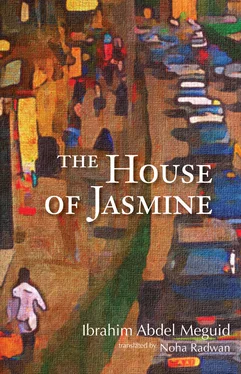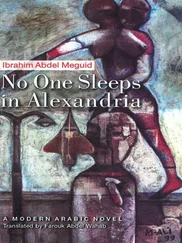I actually passed my high-school exams that year, but my grades were not good enough for me to go to college. I wasn’t upset. I had no desire to learn anymore. I found a job in a new shipyard. I told my father that I would finish building our new house. He must have hated the hills after we moved there, because he didn’t stay long. I hated the whole area, but where could I go? I learned that time was the best cure. The days passed meaninglessly. The area became more crowded, and children started playing in the dirty alleys around us. I learned that our desire for beauty is an acquired habit, and that we can become completely indifferent to our surroundings. I no longer hated the hills but came to feel indifferent toward them. I was even indifferent to the youth camp, which I used to notice on my way to work every day and remember how I had first learned to shoot, and how I used to stick a kerchief under my shirt to absorb the recoil of the Mauser gun. Even this camp lost its ability to attract my attention. I stopped looking at it. Only yesterday, I looked at it again to discover that the sign on its entrance had been replaced by another that said “Central Police Camp.”
I thought that my mother had become as indifferent as I was, and it wasn’t until it was too late that I realized she was more like my father. I took care of her faithfully, but it was useless. Those who say that children can make a woman forget about her deceased husband are liars. She never forgot Muhammad ‘Ali Shagara, who disappointed me when I wanted to put some joy into his bleeding chest. Now she was doing it again, leaving me alone and going away with the white ships. . I must be the one who killed her. I took her from the grim hills to the wide-open universe, and when she couldn’t find other neighbors in the building, and couldn’t go out because this damned apartment is on such a high floor, she took off into the universe. She shouldn’t have done that. She was my mother. How could she leave me alone in this apartment with the bare walls? What woman would brighten up this dismal place? And how could I find her?
Fayyad, who worked in the oxygen preparation station at the shipyard, has now become famous all over Alexandria. He climbed a light tower, thirty meters high, and didn’t come down. During the day he chanted the call to prayer several times, and the workers left their jobs to go watch him. The security officers came and called to him, but he did not respond. One of them tried to climb up to him, but discovered that it was impossible, and that Fayyad had a thick club in his hand. The shipyard manager came and called to him. Still he did not respond. They left him until the next day, and then brought his wife and three children and gave them a megaphone to call to him. Still he did not respond. His wife was a beautiful blonde in rags. At first everyone felt sorry for her, then they lusted after her. They fired shots near the tower, but he did not stir. They left him until the third day, and left his wife and children to sleep under the tower. Then the police and the firemen came, and climbed up to him from all directions, so he took out a knife, and slit his own throat.
Near the end of the year, winter takes hold of Alexandria. Thick black clouds form in the sky, and two storms hit, one after the other. By mid-January, the city is usually soaked in rainwater, and the sun timidly starts to appear. Slowly, it becomes sunnier and sunnier.
People reappear on the streets and tell stories about the rain that penetrated the roof, the wind that broke the window, and the influenza that attacked every member of the family. They talk about how much sugar cane they chewed, how much lemon and orange juice they drank, and how many onions and beans they ate. And there are tales of the electricity that went out, the thunder that frightened the children, the lightning that could be seen through the shutters, the heartless man who kicked his wife out on a cold rainy night and threw her clothes out the window, and the little girl who was standing on the balcony and was carried away into the street by the wind.
Women appear on their balconies, hanging out their wet clothes or just sunning themselves, and the city looks as if she had never endured those short gloomy winter days. The city is like a little child who screams in the shower, but as soon as it’s over and her mother lets her go, she fills the house with joy and laughter.
But I went through that winter on my knees. I hated the year ’76, that year that seemed like an extension of ’67. Those two dirty digits had collaborated against me twice — the first time they took my father from me, and the second, my mother. My mother’s death seemed like a divine punishment, but what could I have done? I only wanted to move a step up. Is there anyone who does not want that?
I often thought of Hassanayn, Magid, and ‘Abd al-Salam, who rarely visited me. They came over once on the day after my mother died. I went to Hassanayn’s house to ask for his help, and he brought them along. Despite our deep friendship, we had never visited each other at home. We always met at the café. My friends weren’t ignoring me. They just hated houses and walls. Then again, perhaps the seed of our separation was always there, despite our apparent harmony.
I bought a 16’’ television set on credit after borrowing two months’ salary from the shipyard for the down payment. I didn’t give much thought to my debt to ‘Abdu al-Fakahani, who came to my mother’s funeral and told me that he didn’t want the money right away. I didn’t regret turning down the offer to participate in the twenty-sixth of July celebrations. They came less than a month after my mother’s death. Al-Dakruri told me at the funeral that he could handle it by himself. I was afraid that the workers would ask him to do what I had done and that he would find out about my scheme. At the time, however, my sadness outweighed my fear, and I forgot to consider this possibility. I later learned that it all went well. I thought that perhaps he did what I had done, and that it had become his own secret. In fact, I came to like al-Dakruri, that thin and pale man. On the day my mother died, he brought me an authorization to let the shipyard and the union pay for the costs of her funeral.
#
Yesterday I went to the café and, despite the cold weather, I found all of them there. Hassanayn laughed and said, “I told you he would come.”
Magid and ‘Abd al-Salam laughed too as they warmly shook hands with me.
“We all function according to a secret clock,” Hassanayn went on after hugging me.
“Thank God that I moved into the apartment before the latest price hike,” I said, “or al-Fakahani might have asked for yet another two hundred pounds.” We all laughed.
“People are talking about nothing but this strange price hike, and they are so irritable, almost ready to fight thin air,” Magid said. We remained silent for a few minutes and then ‘Abd al-Salam said, “Funny we should talk about such public matters, when we haven’t met in so long. We were talking about the same subject before Shagara arrived.”
“Is there nothing new with any of us?” asked Hassanayn.
“You’re right,” ‘Abd al-Salam replied in a voice that sounded like a deep sigh. “There isn’t.” Then he turned to me and said, “I’ll tell you something that I hope won’t upset you.”
He told me that a few days ago he heard Holy Yahya at the bus stop explaining to someone how he makes money out of nothing. He said he bought old houses for ‘Abdu al-Fakahani and that a year ago he bought one in the hills for him for a thousand pounds, which ‘Abdu then sold for three thousand pounds a few days ago. He also said that he made handsome commissions on these sales, and that he was selling carpets and mats only as a façade.
Читать дальше












